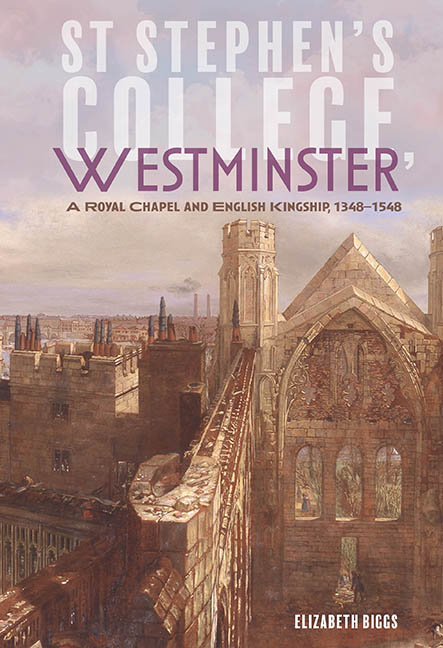Book contents
- Frontmatter
- Contents
- List of Illustrations
- Acknowledgements
- List of Abbreviations
- Preface
- Introduction
- 1 Finding a Place Within Westminster, 1348–1394
- 2 Magnificence and Difficulties under Richard II, 1377–1399
- 3 Weathering Political and Economic Storms, 1399–1485
- 4 A New Kind of Court? Display, Pageantry and Worship, 1471–1536
- 5 Responding to the Reformation, 1527–1548
- Conclusions
- Bibliography
- Index
- Miscellaneous Endmatter
3 - Weathering Political and Economic Storms, 1399–1485
Published online by Cambridge University Press: 28 April 2020
- Frontmatter
- Contents
- List of Illustrations
- Acknowledgements
- List of Abbreviations
- Preface
- Introduction
- 1 Finding a Place Within Westminster, 1348–1394
- 2 Magnificence and Difficulties under Richard II, 1377–1399
- 3 Weathering Political and Economic Storms, 1399–1485
- 4 A New Kind of Court? Display, Pageantry and Worship, 1471–1536
- 5 Responding to the Reformation, 1527–1548
- Conclusions
- Bibliography
- Index
- Miscellaneous Endmatter
Summary
[F]or with huse [us] is myche trobull, and every manne dowtes other.
Simon Stallworth, who was writing from his collegiate house on Canon Row in the troubled days between the ascension of Edward V and the usurpation of Richard III, could have been speaking for the dynastic crises of the fifteenth century more broadly. The period from the deposition of Richard II in 1399 to the victory of Henry VII at Bosworth in 1485 was the most unsettled length of time dynastically for the English Crown during the Middle Ages, and consequently for ideas around legitimate kingship, as at no point in this period was there one wholly undisputed occupant of the English throne. At each moment of regime change the new king had to come to some accommodation not only with the political community of the realm, including the great magnates, but also with those whose service he had inherited from his predecessor, particularly those who worked in and around the Palace of Westminster. The response of St Stephen's to moments of regime change reflected concern to maintain its privileges, develop the careers of its canons, and to ensure that it maintained its status as the king's chapel within the palace. As such, it interacted with the personal and expected pieties of the six men who were king in these eighty-odd years. Each of these kings had to engage with the Church as a patron as well as a source of validation and legitimation. This chapter examines the ways in which all of these kings of England responded to the imagery and institution of Edward III, from whom they all were descended, and who by the 1390s had come to be seen as the perfect king. All of these kings spent time at Westminster and at St Stephen's Chapel and all were remembered in its rounds of commemorative services, with the unsurprising exceptions of Edward V and Richard III. This chapter also examines the institutional response of St Stephen's College to the political and economic difficulties that surrounded them. The college succeeded in maintaining and even improving their financial position even as other institutions and their sister college of St George's Windsor were to struggle with financial difficulties and debt in this period.
- Type
- Chapter
- Information
- St Stephen s College WestminsterA Royal Chapel and English Kingship, 1348–1548, pp. 97 - 136Publisher: Boydell & BrewerPrint publication year: 2020



